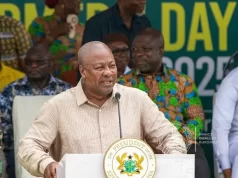Deputy General Secretary of Ghana’s National Democratic Congress (NDC), Mustapha Gbande, has launched a scathing critique of the New Patriotic Party (NPP) government, alleging financial mismanagement and misallocation of resources in key national initiatives, including the Planting for Food and Jobs program.
During an interview on Starr Chart with Bola Ray, Gbande accused the administration of diverting funds intended for critical projects. “They told you and I that they were going to do Planting for Food and Jobs. Brilliant policy… but they brought the project and chopped the money,” he asserted. “They didn’t try in order to say they failed. They have chopped the money.”
His remarks focused on the agricultural initiative’s perceived lack of impact on food security, citing current market prices for staples like maize as evidence of its shortcomings. “Go to the market today and ask for a bag of maize how did that deal with food security? Money went into it, but what did we see?” Gbande questioned, further highlighting a regional minister’s public caution as proof of inadequate oversight.
The criticism extended to other flagship policies, including One District, One Factory and the Free Senior High School (Free SHS) program. While acknowledging the conceptual merit of some initiatives, Gbande condemned their execution as politicized and poorly planned. “One District, One Factory that was a scam. Free SHS was a good policy, but poorly executed. They used it as a political tool, not a social intervention,” he stated.
Reflecting on his own educational struggles, Gbande lamented missed opportunities to leverage Free SHS for broader societal benefit. “I had to struggle to pay my school fees. Free SHS would have helped people like me,” he said, before criticizing the program’s implementation: “They fed the students poorly, didn’t invest in infrastructure, and teachers weren’t motivated. It was a good vision, but the execution was politically motivated.”
Gbande’s allegations amplify ongoing debates over governance and accountability in Ghana’s public sector. Critics argue that while flagship programs have expanded access to education and agriculture support, systemic issues such as underfunded infrastructure, logistical gaps, and allegations of corruption have eroded public trust. The NPP has yet to respond formally to the claims, but the accusations underscore deepening political tensions as stakeholders demand transparency and reforms to ensure policies deliver tangible outcomes.
The controversy highlights a recurring challenge in Ghanaian policymaking: bridging the gap between ambitious proposals and effective, equitable implementation. As calls for audits and program reviews grow louder, the discourse reflects a nation grappling with the balance between political ambition and sustainable development.
Send your news stories to newsghana101@gmail.com
Follow News Ghana on Google News


















